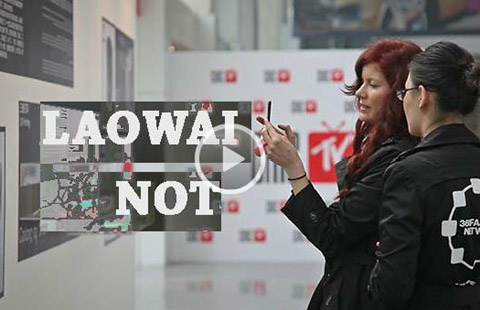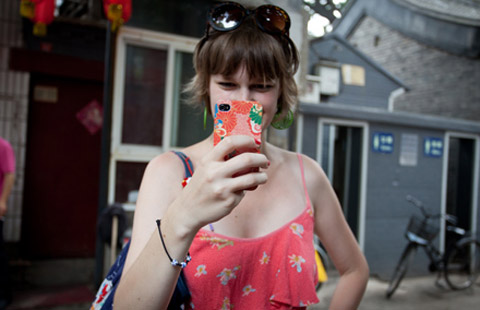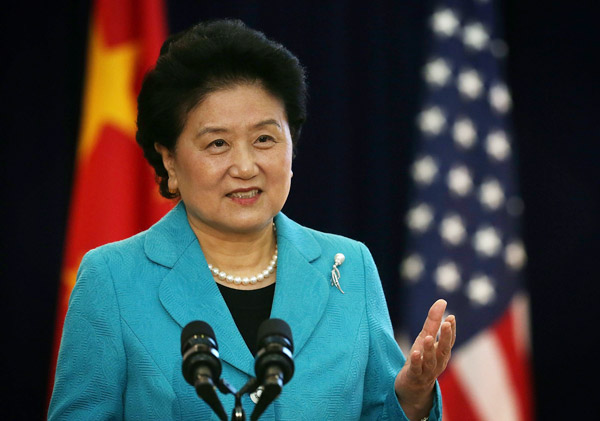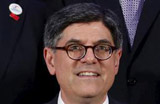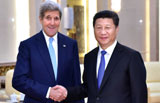Tsinghua students flying high
Updated: 2015-06-22 02:59
By CHEN WEIHUA in Pittsburgh (China Daily USA)
Comments Print Mail Large Medium Small
 |
|
Chinese Vice-Premier Liu Yandong speaks after listening to the introduction about the Pittsburgh School of Medicine on Friday afternoon. [Photo by Chen Weihua / China Daily] |
Students from Tsinghua University are exhilarated after spending time at the University of Pittsburgh's School of Medicine (Pitt Med).
Li Jiatong, who came to Pitt Med a year ago under a partnership program between the two Chinese and US universities, has been interning at the laboratory of Robert Friedlander, a noted neurosurgeon and researcher, in the past year, her first year arriving at Pitt Med.
"The neuroscience is full of unknown and I have been very attracted by that," Li told Chinese Vice-Premier Liu Yandong on Friday. Liu was visiting Pitt Med ahead of the sixth China-US High-Level Consultation on People-to-People Exchange to be held in Washington on June 23.
Describing her mentor Friedlander as a good role model, Li said she has taken the opportunity to listen to every discussion about neurosurgery.
"I will treasure the remaining time at Pitt Med, study hard and work hard and strive to make myself a neurosurgeon and researcher," she said.
The agreement between Tsinghua University School of Medicine and Pitt Med was signed on April 24, 2011, in Beijing. Under the agreement, Tsinghua will send 25 to 45 students to Pitt for two years as visiting research scholars.
The students, who already studied at Tsinghua for more than three years, also have opportunities to observe healthcare activities at the University of Pittsburgh Medical Center (UMPC), one of the largest healthcare systems in the United States and Pitt Med's clinical partner.
Like Li, Guo Hao, another Tsinghua student at Pitt Med, said there is a lot to learn here. "We almost become a ‘workaholic' in the lab, often working seven days a week and more than 12 hours a day," she said.
Guo said that sometimes she has to work even after going home, analyzing data and writing articles. But she said she has learned a lot, not just in communicating in English, but also in advanced scientific research methods and innovative ways of thinking.
Like Li and Guo, Chen Zhaohan, a Tsinghua student who has been studying heart disease at Pitt Med, told Liu that he has not only learned a lot in academic thinking and experimental skills, but, more importantly, how to communicate and teamwork with people of different background and disciplines.
"My dream is to become a physician, and if you want to perform surgery, a good team is indispensable," he said.
"Our partnership with Tsinghua has developed beautifully,"Arthur Levine, dean of Pitt Med, told China Daily.
"The Tsinghua medical students and our faculty are delighted -- the students with their research experience here and with their mentoring, and our faculty with the ability and productivity of the students," said Levine, who is also senior vice-chancellor for the health sciences at the University of Pittsburgh.
He described the Tsinghua students as"among the best of all of our students, American and international".
"Many of the Tsinghua students are equal to excellent graduate students and even post-doctoral fellows, despite that they had relatively little research experience before coming here," Levine said.
So far, 67 Tsinghua students have participated in the partnership program, with 12 more coming this summer. These students have been authors and co-authors of 30 articles in major peer-reviewed medical and scientific journals, and many more papers are waiting publication or being prepared. Many students have also participated in international conferences and some made presentations.
Asked how the program could be improved further, Levine said some students would like to spend a third year at Pitt Med before returning to Beijing. "It would be helpful to our school if more money was available to cover the students' use of laboratory supplies and other research resources. He described it as a very challenging environment now for federal support of medical research in the US.
Besides training Tsinghua students, the partnership between the Chinese and American universities also includes holding a symposium every year,alternating between the two countries. Levine said he is looking forward to the next one in Beijing in spring of 2016.
Besides the partnership with Tsinghua, Pitt Med has also been helping Chinese doctors treating people suffering from strokes under its telestroke program.
"We can help the doctors in China make the correct diagnosis so that the stroke will be treated properly," Levine said. And he said he hoped that such cooperation could be expanded into other areas of medicine.
Liu thanked the Pitt Med faculty for their contribution to China's medical cause and taking good care of the Tsinghua students. She described more cooperation between China and Pitt Med as very necessary.
Liu, an alumna of Tsinghua, also encouraged the Tsinghua students to treasure the opportunity of studying in such a great school in the US. She told them to study hard and master the knowledge in order to better contribute to the motherland and the public health of people.
chenweihua@chinadailyusa.com


